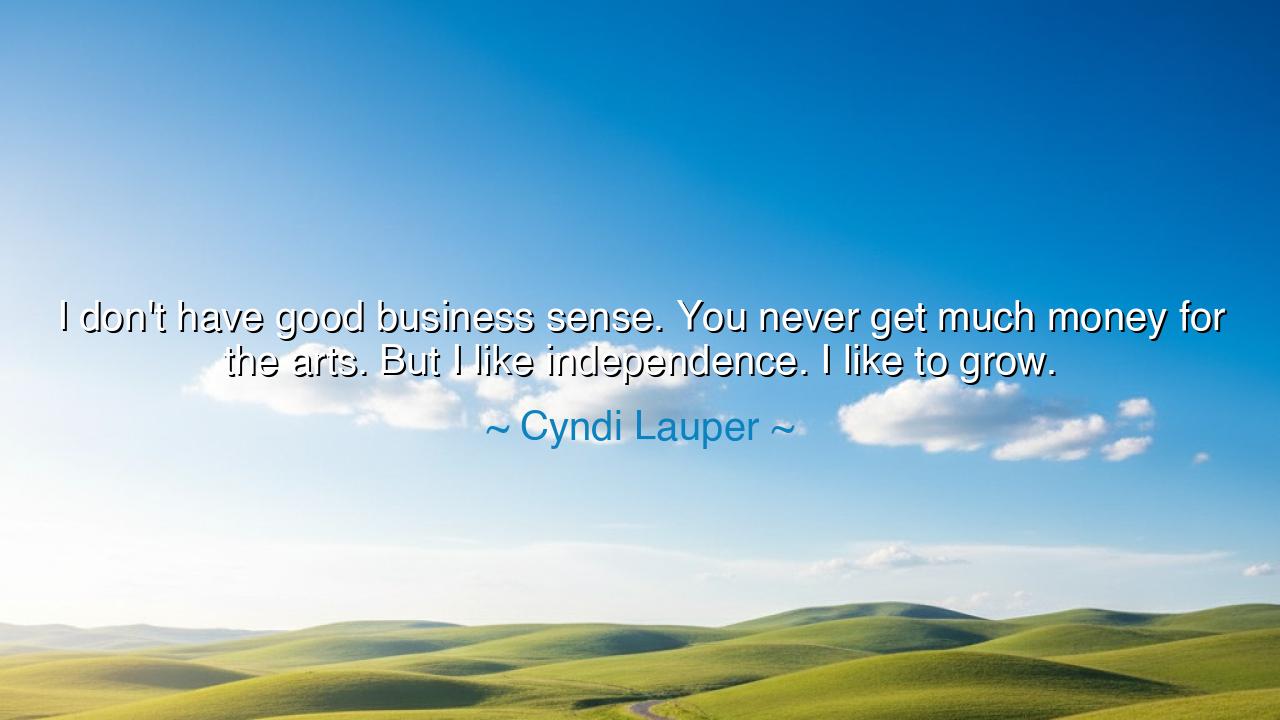
I don't have good business sense. You never get much money for
I don't have good business sense. You never get much money for the arts. But I like independence. I like to grow.






The Courage to Grow in Freedom
Hear now the words of Cyndi Lauper, a voice both radiant and rebellious, who once said:
“I don’t have good business sense. You never get much money for the arts. But I like independence. I like to grow.”
These words, though simple in form, are as rich in spirit as the song of a soul that refuses to be tamed. In them, Lauper speaks not merely of career or craft, but of the eternal choice between security and freedom, between comfort and creation. For those who walk the path of art—and indeed, of any honest life—must one day decide: shall I be ruled by gain, or guided by growth?
The Sacred Poverty of the Artist
Lauper’s confession, “You never get much money for the arts,” is not a lament but a truth spoken with serenity. The artist’s reward is rarely counted in coin. The ancients knew this well. The poet Homer wandered blind and poor, yet his verses built temples of memory more enduring than stone. Michelangelo, who painted the Sistine Chapel, slept upon the floor of his studio. Van Gogh sold only one painting before death, yet painted a thousand suns for generations unborn.
Thus, Lauper stands in a lineage of creators who understood that art is not a trade, but a calling. Those who answer it exchange the riches of the world for the wealth of the soul. For what the artist seeks is not gold, but the freedom to be true—to express, to evolve, to grow.
The Meaning of Independence
When she declares, “I like independence,” Lauper speaks the language of all who have chosen authenticity over approval. To be independent is not merely to live without constraint—it is to act without fear of losing favor. It is to stand upon one’s own vision, even when the world refuses to understand.
This is no easy path. The independent soul must walk alone through storms of doubt and rejection. Yet such solitude is the price of truth. For just as the eagle soars only when it leaves the flock, so too must the creator rise above the market and the crowd to find the winds of inspiration.
The Ancient Parable of Freedom and Fortune
Consider the tale of Diogenes of Sinope, the philosopher who owned nothing yet called himself the richest man in Greece. When Alexander the Great offered him anything he desired, Diogenes replied, “Stand out of my sunlight.” He needed no gold, no favor—only the freedom to exist in his own light. So too, Lauper’s words reflect this same eternal defiance: a declaration that to live freely is worth more than to live richly.
For the one who clings to gold may lose their soul; but the one who clings to independence becomes a living flame, burning bright and unbought.
The Growth of the Spirit
Lauper’s final words, “I like to grow,” reveal the sacred heart of her philosophy. Growth is the true measure of a life well-lived. To grow is to shed one’s skin again and again—to move beyond comfort, beyond fear, beyond past versions of the self. The artist who ceases to grow has already begun to fade.
And yet, growth cannot be commanded by wealth or power. It blossoms only in freedom—the freedom to fail, to explore, to change. Lauper’s independence is thus not rebellion, but nourishment. It is the soil in which her art, her humanity, and her courage take root.
The Lesson for the Seeker
Let this be a teaching for all who would follow the path of authenticity: do not measure your worth by the coins you gather, but by the depth of your becoming. Wealth can feed the body, but growth feeds the soul. If you must choose between a full purse and a full heart, choose the heart—and let the world call you foolish. For only through independence can you discover the infinite landscape within yourself.
Seek your craft, your calling, your purpose—not for the applause, but for the awakening it brings. Let every struggle refine you, every loss strengthen you, and every act of courage expand your being.
The Eternal Teaching of the Artist
Thus, Cyndi Lauper’s words echo across time as a hymn to the brave: “I like independence. I like to grow.” They are the prayer of all who live not to possess, but to create; not to conquer, but to become. She reminds us that life’s greatest masterpiece is not a painting or a song—it is the soul that refuses to remain small.
So live as she lives—fearless in your expression, humble in your beginnings, rich in your becoming. Let your independence be your art, and your art be your growth. For the world may not always pay you in gold, but it will remember you in light.






AAdministratorAdministrator
Welcome, honored guests. Please leave a comment, we will respond soon